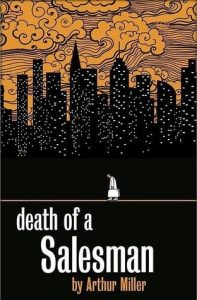
 Literature Guides
Literature Guides
Death of a Salesman – Quotations and Analysis
Quotations and Analysis
“And when I saw that, I realized that selling was the greatest career a man could want. ’Cause what could be more satisfying than to be able to go, at the age of eighty-four, into twenty or thirty different cities, and pick up a phone, and be remembered and loved and helped by so many different people?”
From Act II, Willy romanticizes the legendary salesman Dave Singleman. He sees this man as an ideal, someone who worked until he was 84 and died on the road living the life of a salesman. Willy places emphasis on being liked and being helped by others rather than the substance of his or Singelman’s life. He also fails to recognize that Singleman was working in his 80s and was almost certainly struggling financially. The shallow and deluded way that Willy sees the world is evident in this quotation. He cannot see the reality of this man and wants only to see his own life be characterized by recognition and “being liked.”
“I saw the things that I love in this world. The work and the food and the time to sit and smoke. And I looked at the pen and I thought, what the hell am I grabbing this for? Why am I trying to become what I don’t want to be . . . when all I want is out there, waiting for me the minute I say I know who I am.”
This is from Act II when Willy and Biff have their final confrontation. Biff attempts to explain to Willy why he cannot fit into Willy’s expectations. That Biff expresses a desire to be who he truly want to be is utterly mystifying and infuriating to Willy. For Willy, life means to fit into a prescribed roles in order to succeed. Biff defies this and by doing, he cuts Willy’s sense of self and purpose. This is a devastating moment for Willy. Biff rejects the life of a salesman. He takes a stand to identify himself on his own terms. These are things Willy never had the courage to do, and Biff shows Willy that he is a failure.
“He’s a man way out there in the blue, riding on a smile and a shoeshine . . . A salesman is got to dream, boy.”
Charley says this at the end in the requiem. He waxes poetic about the life of a salesman as he eulogizes Willy. He paints Willy as a victim of his profession, and attributes to Willy the mythic quality which Willy aspired for in life. This is the same mythic quality Willy saw in Singleman. In the end, this quotation relies on the image of the dream. All Willy has was a dream. Once the dream was shattered, his life shattered with it.



